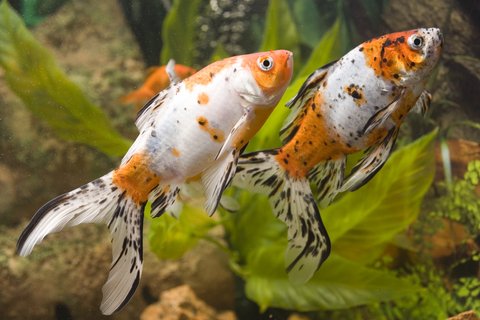What To Feed Goldfish
There are many options of what to feed goldfish. Most commonly they are fed flake foods, but can also be feed frozen or freeze-dried foods and live foods. There are even some household foods you can feed your pets.
Your fish can survive a lifetime on flake food alone. But, if you desire active, colorful, healthy fish, you must vary their diet. Flake food is a pretty good source of nutrition. Using it as a staple and substituting a variety of foods several times a week can optimize their health. This is especially important if you are considering breeding.
Just as proteins, vitamins and minerals are important for your growth they are also important for your fish and should be taken into acount when feeding goldfish. They are particularly important for any type of exotic fish, especially those with a head growth like the Lionheads, Pompon and Oranda. Carbohydrates and Fats are necessary for energy souces. Fat storage is important for outdoor pond fish so they can survive the colder winter months. Fiber is important for a healthy digestive system. Your fish should regulary eat foods from the vegetable, cereal, and meat food groups for optimum health.
FLAKE FOODS
The most important thing to know is that goldfish have different nutritional requirements from tropical fish so should NOT be fed tropical fish food.
Flake and dried foods are available in many shapes and sizes from a multitude of manufacturers that meet their unique nutritional requirements. Some manufacturers will add in vitamin supplements but this is not necessary if you vary their diet. The foods are available in flakes, granules and pellets.
LIVE FOODS
When feeding goldfish live foods are the best. But, they carry the risk of transferring diseases to your fish and aquarium. They can be obtained in small quantities from most local aquarium stores in one to two serving sizes. If obtained from a local store it is pretty safe as it is probably grown on site and fed to their own fish. The only live foods that generally do NOT have the potential to carry disease transferable to your fish are brine shrimp and earthworms.
The most common live foods are brine shrimp, earthworms, tubifex worms, whiteworms, drosophila, daphnia, and bloodworms.
Caution: It is not a good idea to go searching in lakes and ponds for live food as there is a very high risk of parasites and other infectious diseases.
FROZEN or FREEZE-DRIED FOODS
The advantage of these foods is the convenience of providing a variety of food for your fish without too much effort. Your fish get the benefits that live foods carry without the risk of diseases. These include brine shrimp, krill, tubiflex worms, mosquito larvae, bloodworms and daphnia.
HOUSEHOLD FOODS
Household foods should be given to your fish in moderation and should always be diced or shredded. Only high quality foods with no spices.... NOT even salt. Please, no scraps from your dinner table.
Frozen: Serve thawed. Clams, mussels, shrimp, lobster, crab, fish and oysters.
Canned: Same as frozen plus beans and peas.
Raw: Same as frozen plus spinach, lettuce and ground beef.
Cooked (baked, steamed or boiled): Potatoes, beans, peas, egg yolk, broccoli, and cauliflower.








As an example of what to feed goldfish we have put together a 28 day 'sample goldfish diet' page.
Rules for Feeding
- Only feed an amount that can be eaten within FIVE minutes. Promptly remove any excess food.
- Feed that at the same time each day. Once in the morning and once in the evening.
- Always feed them in the same spot in the tank.
- Don't over feed your fish. More goldfish die from over eating than anything else.
- When going away for the weekend don't worry about what to feed your goldfish. Don't feed them at all. They can survive for up to three weeks without eating. (They might be a little grumpy upon your return, though :-) ).


Back to Top of 'What to Feed Goldfish' Page
Care items recommended for your goldfish.